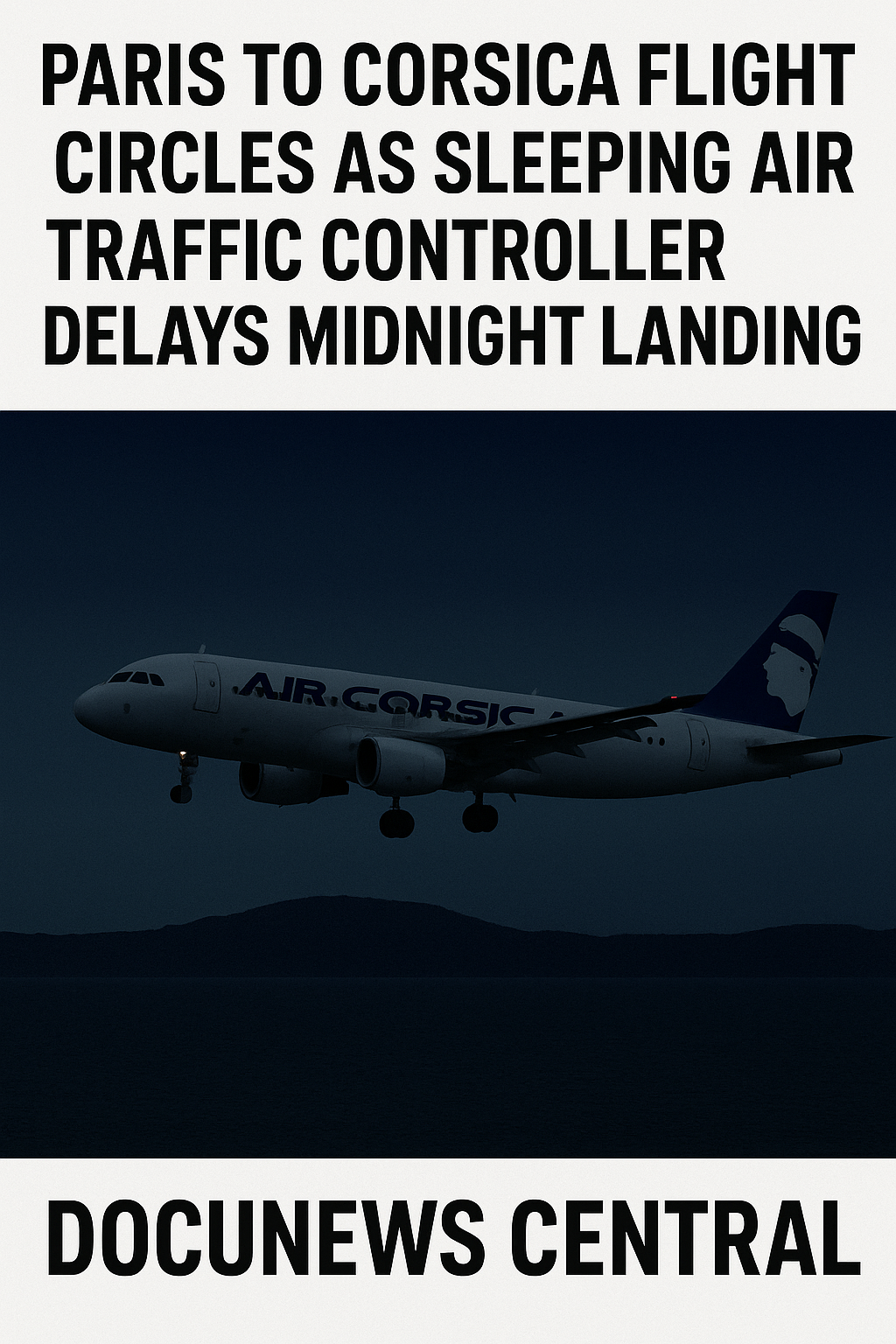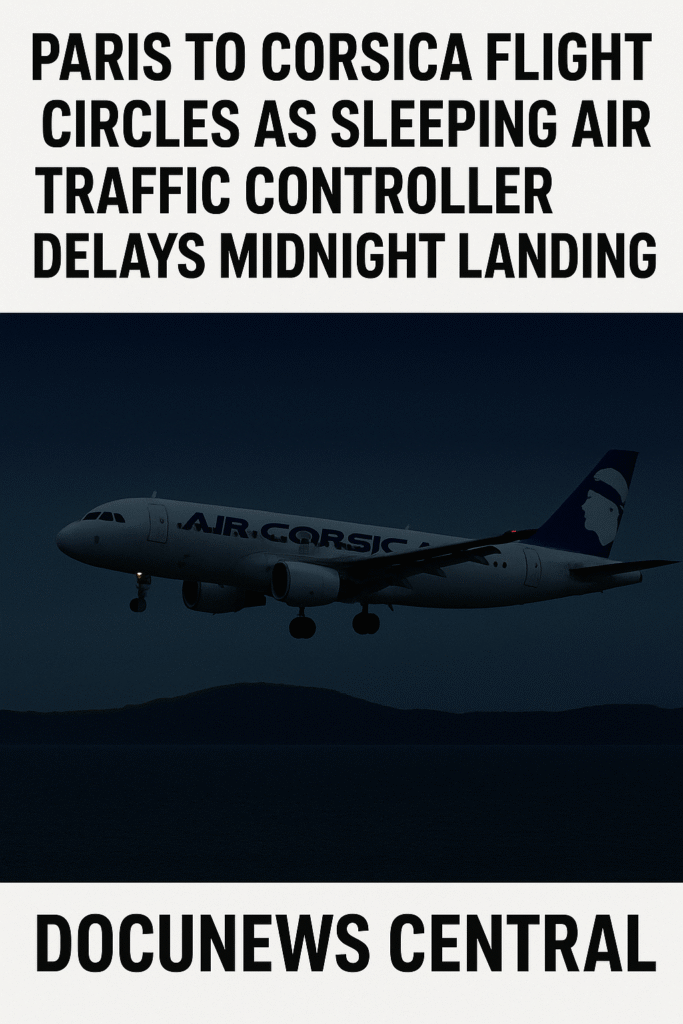

Paris to Corsica Flight Circles as Sleeping Air Traffic Controller Delays Midnight Landing
A Scary Night Flight Over the Mediterranean
Passengers on an Air Corsica Airbus A320 faced a tense night on September 16, 2025.
The plane left Paris Orly Airport late in the evening.
Its destination was Napoleon Bonaparte Airport in Ajaccio, Corsica.
The flight was smooth until it reached the island.
Then an unexpected problem stopped the pilots from landing.
The only air traffic controller on duty at the airport had fallen asleep.
The pilots could not reach him by radio.
The runway lights were off.
The plane could not land in the dark.
Holding Pattern Over the Gulf of Ajaccio
The crew kept the aircraft in a safe holding pattern.
They circled over the Gulf of Ajaccio.
The calm sea below was dark and quiet.
Inside the cabin, passengers wondered why the plane did not descend.
The pilots stayed calm and kept control.
According to flight data, the plane circled for about 20 minutes.
Some reports later said it might have been close to an hour.
Either way, it felt like a long wait for everyone on board.
Attempts to Wake the Sleeping Controller
Regional air traffic controllers tried to help from a distance.
They called the tower again and again.
No one answered.
The man inside the tower slept on.
Firefighters and police were alerted.
They raced to the airport tower.
Security locks slowed them down.
They needed to break through restricted doors.
Every minute counted as the plane kept circling.
Pilots Considered a Diversion
The pilots knew the fuel was limited.
They discussed a possible diversion to Bastia Airport, another Corsican city.
It was the nearest option for a safe landing.
The crew informed regional controllers of their plan.
But before the plane left the area, the situation changed.
Controller Finally Wakes Up
The sleepy controller suddenly woke up.
He checked the radio and heard the urgent calls.
He quickly switched on the runway lights.
He cleared the Air Corsica flight to land.
The pilots guided the Airbus A320 down.
The landing was smooth and safe.
Passengers finally touched the ground after a tense wait.
Relief swept through the cabin.
Tests for Drugs and Alcohol
Authorities tested the controller for drugs and alcohol.
Results were negative.
He was not under the influence of any substance.
The problem was simple but serious: he had fallen asleep on duty.
Officials did not release his name.
They said an internal investigation had begun.
The man could face disciplinary action.
The case might also lead to wider changes in staffing and schedules.
Reactions from Passengers
Some passengers said they were calm but confused.
They had no idea why the plane circled.
The crew gave only short updates during the delay.
Others admitted they felt fear when they heard the reason after landing.
They called the incident “shocking” and “unbelievable.”
One traveler told a French news outlet it felt “like a scene from a movie.”
Another said the crew remained professional and kept everyone safe.
Air Corsica Issues a Statement
Air Corsica released a short public statement.
It confirmed the event and thanked the pilots for their skill.
The airline promised to work with aviation authorities.
They want to prevent anything like this from happening again.
The airline stressed that the passengers were never in immediate danger.
But it agreed the incident was serious and must be reviewed.
French Aviation Authority Responds
The French Civil Aviation Authority (DGAC) launched an investigation.
Officials said they take the event very seriously.
They will study staffing levels at small airports like Ajaccio.
They will also review the procedures for night operations.
Experts say night shifts are tough for controllers.
Fatigue is a known risk.
But a complete loss of communication is rare.
The DGAC promised to share findings once the inquiry ends.
Experts Warn of Fatigue in Air Traffic Control
Aviation experts have long warned of fatigue among air traffic staff.
Night shifts disrupt normal sleep cycles.
If schedules are too tight, workers may nod off.
A retired controller told French TV that night work can be “brutal.”
He said controllers often work alone at small airports at night.
He urged for two people on every shift.
That way, if one person becomes unwell or sleepy, the other can respond.
Safety Rules and Future Changes
International aviation rules require safe landing conditions at all times.
Runway lights are vital for night landings.
Without them, pilots cannot see the runway clearly.
This is why the pilots could not risk landing until the lights were on.
The DGAC may now demand more staff at night.
They may also improve alarm systems in towers.
Some experts suggest installing automatic runway light systems.
These could turn on if a plane approaches and no controller responds.
Local Community Shocked
Ajaccio residents expressed shock after hearing the story.
Napoleon Bonaparte Airport is small but busy.
It handles many flights from mainland France.
A shop owner near the airport said he never thought such a thing could happen.
He hopes the government will ensure it never repeats.
Tourism leaders also worry about the impact.
Corsica depends on visitors.
Safety concerns could harm its image.
Passengers Praise Pilots and Crew
Many travelers praised the pilots for their calm actions.
They kept the plane safe and made clear choices.
They were ready to divert to Bastia if needed.
Their skill prevented panic and protected lives.
The cabin crew also stayed professional.
They kept passengers informed as best they could.
Several passengers thanked them personally after the flight.
Questions About Airport Staffing
The event exposed a larger problem.
Why was only one controller on duty?
Why was there no backup plan if that person failed to respond?
Local unions have already called for a review.
They say more staff must be on duty at night.
They also want better monitoring to spot if a controller stops responding.
Global Attention on the Incident
The story spread quickly beyond France.
News outlets in Europe, the United States, and Asia reported it.
Many readers expressed disbelief.
Social media filled with jokes and serious concerns.
Some people made light of the “sleeping controller.”
Others warned that it shows a need for stronger safety rules.
A Reminder of Aviation Safety Challenges
This rare event ended without harm.
But it shows that aviation safety depends on people as well as machines.
Even in modern times, human error can cause risk.
The pilots’ training and quick thinking protected everyone on board.
But the event highlights the need for strong staffing and alertness.
Investigation Will Continue
Officials will question the controller in detail.
They will look at his work hours, rest schedule, and any signs of fatigue.
They will also check the airport’s staffing records.
The DGAC will publish its findings in the coming weeks.
If new safety measures are required, they will be put in place across France.
Lessons Learned
The Ajaccio incident teaches key lessons.
Air traffic control is vital for every flight.
Even one lapse can create risk for many people.
Regular rest, proper staffing, and back-up systems are essential.
Airlines and aviation authorities around the world will watch the French inquiry.
They may adopt new safeguards to avoid a repeat elsewhere.
A Night to Remember for Passengers
For those aboard the Air Corsica flight, it was a night they will never forget.
What began as a simple late-night journey turned into an unexpected ordeal.
Thanks to skilled pilots and quick action by emergency teams, everyone landed safely.
The sleepy controller’s mistake will likely lead to big changes in French air traffic control.
And passengers will long remember the strange night when their plane circled the dark Gulf of Ajaccio waiting for someone to wake up.








